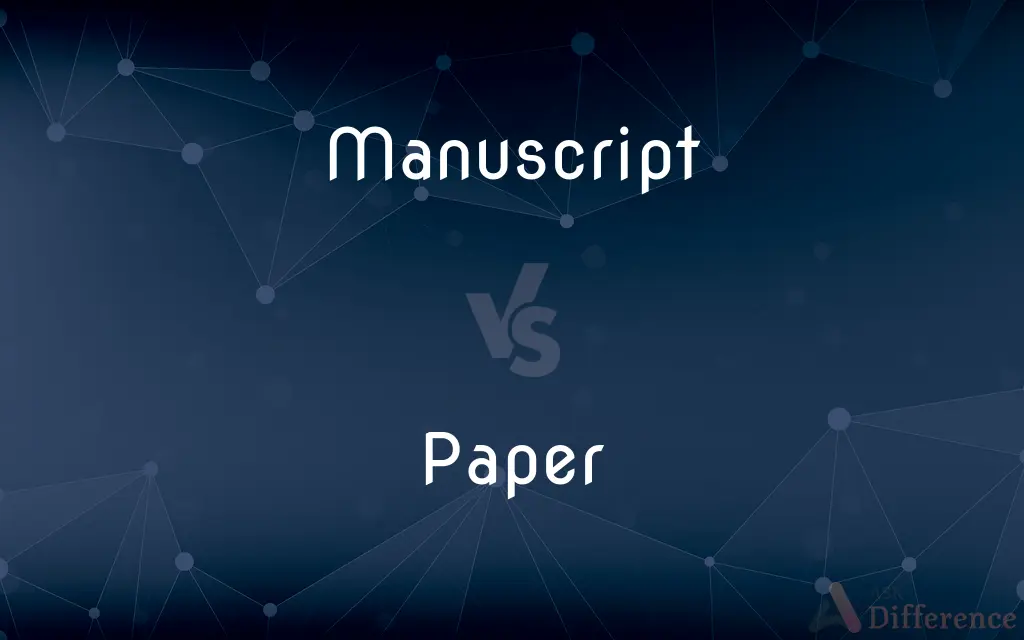Manuscript vs. Paper — What's the Difference?
By Fiza Rafique & Maham Liaqat — Updated on April 2, 2024
A manuscript refers to the original, unpublished work of an author, often detailed and extensive, while a paper usually denotes a shorter, often published piece, particularly in academic or scientific contexts.

Difference Between Manuscript and Paper
Table of Contents
ADVERTISEMENT
Key Differences
Manuscripts are the original works created by authors or researchers, embodying the raw and unrefined content prior to any formal publication process. These can range from literary works to comprehensive research studies. In contrast, a paper, especially in academic circles, is understood to be a concise, often peer-reviewed document that is published in a journal or presented at a conference. Papers focus on presenting research findings, theories, or reviews and are usually subjected to a rigorous review process before publication.
Manuscripts, in their traditional sense, were handwritten or typed documents prepared before the era of digital publishing. Today, they encompass any unpublished work, including novels, plays, or research studies, awaiting peer review or publication. On the other hand, papers are recognized as the polished outcome of research efforts, sharing new knowledge or insights within the scholarly community. They are formatted according to specific journal or conference guidelines, making them more formal and standardized than manuscripts.
The length and content of a manuscript can significantly vary, often being more extensive and detailed, providing a deep dive into the subject matter. Manuscripts serve as the foundation from which papers are derived, especially in research, where the comprehensive data and analyses are condensed into a paper for publication. Papers, by nature, are more succinct, focused on the core findings and arguments, making them accessible to the academic community and beyond.
The review process marks a critical distinction between the two. Manuscripts undergo a transformation during the peer review process, where they are critiqued, revised, and refined into a form suitable for public dissemination. Papers, once published, have passed through this scrutiny, embodying research that the academic community recognizes as valuable and credible.
The purpose of each also differs; manuscripts often represent the work in its entirety, serving as a detailed record of the research or literary effort. Papers, particularly in science and academia, aim to communicate specific findings, theories, or methodologies to a broader audience, facilitating further research and discussion within the field.
ADVERTISEMENT
Comparison Chart
Definition
Original, unpublished work of an author or researcher.
A published document that presents research findings or theories.
Context
Can be literary, academic, or scientific, prior to publication.
Primarily academic or scientific, intended for publication.
Length and Detail
Typically more extensive and detailed.
More concise and focused on key findings or arguments.
Review Process
Undergoes peer review for refinement and validation.
Has passed peer review and been published.
Purpose
Provides a comprehensive view of the work or study.
Communicates specific research findings or insights.
Compare with Definitions
Manuscript
The foundational document of a study.
The doctoral candidate reviewed his thesis manuscript for the final time before submission.
Paper
A publication in an academic journal.
His latest paper explores the implications of renewable energy policies.
Manuscript
An original, unpublished work, often extensive.
The author submitted her novel manuscript to several publishers.
Paper
A published article in a scientific journal.
The paper on climate change was cited by numerous subsequent studies.
Manuscript
A work in its raw form.
The manuscript contained all the raw data and analyses from the experiment.
Paper
A concise report of a study or review.
The review paper summarized the current state of nanotechnology research.
Manuscript
Detailed research awaiting publication.
The research team completed the manuscript detailing their groundbreaking study.
Paper
A document presenting concise research findings.
She presented her paper at the international conference last month.
Manuscript
A document prepared for peer review.
The manuscript was sent to a journal for peer review.
Paper
A peer-reviewed scholarly article.
The paper underwent several rounds of review before publication.
Manuscript
A manuscript (abbreviated MS for singular and MSS for plural) was, traditionally, any document written by hand – or, once practical typewriters became available, typewritten – as opposed to mechanically printed or reproduced in some indirect or automated way. More recently, the term has come to be understood to further include any written, typed, or word-processed copy of an author's work, as distinguished from its rendition as a printed version of the same.
Paper
Paper is a thin sheet material produced by mechanically or chemically processing cellulose fibres derived from wood, rags, grasses or other vegetable sources in water, draining the water through fine mesh leaving the fibre evenly distributed on the surface, followed by pressing and drying. Although paper was originally made in single sheets by hand, almost all is now made on large machines—some making reels 10 metres wide, running at 2,000 metres per minute and up to 600,000 tonnes a year.
Manuscript
A book, document, or piece of music written by hand rather than typed or printed
Early Gothic manuscripts
An illuminated manuscript
Paper
Material manufactured in thin sheets from the pulp of wood or other fibrous substances, used for writing, drawing, or printing on, or as wrapping material
Toffee papers
A paper napkin
A sheet of paper
Manuscript
A handwritten book, poem, or other document, or a collection of such handwritten documents bound together
The contents of the manuscript include a romance and a saint's life.
Paper
A sheet of paper with something written or printed on it
He riffled through the papers on his desk
Manuscript
A version of a book, article, or other work before being published or prepared for publication
The author submitted the manuscript as a text file.
Paper
A set of examination questions to be answered at one session
We had to sit a three-hour paper
Manuscript
Handwriting, especially in contrast to print
Her last poems were left in manuscript.
Paper
An essay or dissertation, especially one read at an academic lecture or seminar or published in an academic journal
He published a highly original paper on pattern formation
Manuscript
Handwritten, or by extension manually typewritten, as opposed to being mechanically reproduced.
Paper
Free passes of admission to a theatre or other entertainment.
Manuscript
A book, composition or any other document, written by hand (or manually typewritten), not mechanically reproduced.
Paper
Apply wallpaper to (a wall or room)
The walls were papered in a Regency stripe
Manuscript
A single, original copy of a book, article, composition etc, written by hand or even printed, submitted as original for (copy-editing and) reproductive publication.
Paper
Fill (a theatre) by giving out free tickets
Surely the theatre could at least have papered the house if the box office was looking so poor
Manuscript
Written with or by the hand; not printed; as, a manuscript volume.
Paper
A material made of cellulose pulp, derived mainly from wood, rags, and certain grasses, processed into flexible sheets or rolls by deposit from an aqueous suspension, and used chiefly for writing, printing, drawing, wrapping, and covering walls.
Manuscript
An original literary or musical composition written by the author, formerly with the hand, now usually by typewriter or word processor. It is contrasted with a printed copy.
Paper
A single sheet of this material.
Manuscript
Writing, as opposed to print; as, the book exists only in manuscript.
Paper
A formal written composition intended to be published, presented, or read aloud; a scholarly essay or treatise.
Manuscript
The form of a literary work submitted for publication
Paper
A piece of written work for school; a report or theme.
Manuscript
Handwritten book or document
Paper
Often papers An official document, especially one establishing the identity of the bearer.
Paper
Papers A collection of letters, diaries, and other writings, especially by one person
The Madison papers.
Paper
Short-term debt instruments, especially commercial paper.
Paper
A newspaper.
Paper
Wallpaper.
Paper
A wrapper made of paper, often with its contents
A paper of pins.
Paper
A free pass to a theater.
Paper
The audience admitted with free passes.
Paper
To cover, wrap, or line with paper.
Paper
To cover with wallpaper.
Paper
To supply with paper.
Paper
(Slang) To issue free passes for (a theater, for example).
Paper
To construct (something) in haste and with little forethought
Papered together a new coalition of political convenience.
Paper
Made of paper.
Paper
Resembling paper, as in thinness or flimsiness.
Paper
Of or relating to clerical work
Paper duties.
Paper
Existing only in printed or written form
Paper profits.
A paper corporation.
Paper
Planned but not realized; theoretical.
Paper
A sheet material used for writing on or printing on (or as a non-waterproof container), usually made by draining cellulose fibres from a suspension in water.
Paper
A newspaper or anything used as such (such as a newsletter or listing magazine).
Paper
(uncountable) Wallpaper.
Paper
(uncountable) Wrapping paper.
Paper
(rock paper scissors) An open hand (a handshape resembling a sheet of paper), that beats rock and loses to scissors. It loses to lizard and beats Spock in rock-paper-scissors-lizard-Spock.
Paper
A written document, generally shorter than a book (white paper, term paper), in particular one written for the Government.
Paper
A written document that reports scientific or academic research and is usually subjected to peer review before publication in a scientific journal (as a journal article or the manuscript for one) or in the proceedings of a scientific or academic meeting (such as a conference, workshop, or symposium).
Paper
A scholastic essay.
Paper
(Britain) A set of examination questions to be answered at one session.
Paper
(slang) Money.
Paper
Any financial assets other than specie.
Paper
(New Zealand) A university course. en
Paper
A paper packet containing a quantity of items.
A paper of pins, tacks, opium, etc.
Paper
A medicinal preparation spread upon paper, intended for external application.
Cantharides paper
Paper
A substance resembling paper secreted by certain invertebrates as protection for their nests and eggs.
Paper
(dated) Free passes of admission to a theatre, etc.
Paper
The people admitted by free passes.
Paper
Made of paper.
Paper bag; paper plane
Paper
Insubstantial from the weakness of common paper
Paper tiger; paper gangster
Paper
Planned from plans being drawn up on paper
Paper rocket; paper engine
Paper
Having a title that is merely official, or given by courtesy or convention.
A paper baron; a paper lord
Paper
(transitive) To apply paper to.
To paper the hallway walls
Paper
(transitive) To document; to memorialize.
After they reached an agreement, their staffs papered it up.
Paper
(transitive) To fill (a theatre or other paid event) with complimentary seats.
Paper
(transitive) To submit official papers to (a law court, etc.).
Paper
(transitive) To give public notice (typically by displaying posters) that a person is wanted by the police or other authority.
Paper
(transitive) To sandpaper.
Paper
(transitive) To enfold in paper.
Paper
To paste the endpapers and flyleaves at the beginning and end of a book before fitting it into its covers.
Paper
A substance in the form of thin sheets or leaves intended to be written or printed on, or to be used in wrapping. It is made of rags, straw, bark, wood, or other fibrous material, which is first reduced to pulp, then molded, pressed, and dried.
Paper
A sheet, leaf, or piece of such substance.
Paper
A printed or written instrument; a document, essay, or the like; a writing; as, a paper read before a scientific society.
They brought a paper to me to be signed.
Paper
A printed sheet appearing periodically; a newspaper; a journal; as, a daily paper.
Paper
Negotiable evidences of indebtedness; notes; bills of exchange, and the like; as, the bank holds a large amount of his paper.
Paper
Decorated hangings or coverings for walls, made of paper. See Paper hangings, below.
Paper
A paper containing (usually) a definite quantity; as, a paper of pins, tacks, opium, etc.
Paper
A medicinal preparation spread upon paper, intended for external application; as, cantharides paper.
Paper
Documents establishing a person's identity, or status, or attesting to some right, such as the right to drive a vehicle; as, the border guard asked for his papers.
Paper
Of or pertaining to paper; made of paper; resembling paper.
Paper
Existing only on paper; unsubstantial; as, a paper box; a paper army; a paper tiger.
Paper
To cover or line with paper, especially with wallpaper; to furnish with paper hangings; to wallpaper; as, to paper a room or a house.
Paper
To fold or inclose in paper.
Paper
To put on paper; to make a memorandum of.
Paper
A material made of cellulose pulp derived mainly from wood or rags or certain grasses
Paper
An essay (especially one written as an assignment);
He got an A on his composition
Paper
A daily or weekly publication on folded sheets; contains news and articles and advertisements;
He read his newspaper at breakfast
Paper
A scholarly article describing the results of observations or stating hypotheses;
He has written many scientific papers
Paper
Medium for written communication;
The notion of an office running without paper is absurd
Paper
A business firm that publishes newspapers;
Murdoch owns many newspapers
Paper
A newspaper as a physical object;
When it began to rain he covered his head with a newspaper
Paper
Cover with paper;
Paper the box
Paper
Cover with wallpaper
Paper
Made of paper;
They wore paper hats at the party
Common Curiosities
Can a manuscript become a paper?
Yes, through the process of peer review and revision, a manuscript can be refined and published as a paper in an academic journal or conference proceedings.
Why is peer review important for manuscripts?
Peer review is crucial as it ensures the accuracy, credibility, and relevance of the research or literary work, refining the manuscript into a paper that contributes valuable knowledge to the field.
How long does the transition from manuscript to paper take?
The duration can vary widely depending on the field, the journal's review process, and the extent of revisions required, potentially ranging from months to over a year.
What is the primary purpose of a manuscript?
The primary purpose of a manuscript is to serve as the original, comprehensive documentation of an author's work, whether it's research findings, a novel, or a study, prior to publication.
Is there a difference in format between a manuscript and a paper?
Yes, manuscripts are the author's original work without strict formatting, while papers must adhere to specific guidelines of journals or conferences for publication.
How does a paper differ from a manuscript in academic research?
In academic research, a paper is a concise, peer-reviewed, and published document that presents specific findings or theories, derived from the more extensive and detailed manuscript.
Can all manuscripts be published as papers?
Not all manuscripts reach publication as papers; they must contribute significant, credible, and relevant findings or insights and pass through rigorous peer review.
Do manuscripts and papers serve the same audience?
While both target academic or professional audiences, papers, being published and more accessible, reach a broader audience than manuscripts.
How do authors decide between submitting a manuscript or a paper?
Authors submit manuscripts for peer review and potential publication; if accepted, the manuscript is revised according to reviewer feedback and published as a paper.
Are manuscripts considered public domain?
Manuscripts remain the intellectual property of the author or creator until publication, at which point copyright and publishing rights are often transferred to the journal.
Share Your Discovery

Previous Comparison
Advertising vs. Campaign
Next Comparison
Gulp vs. SwallowAuthor Spotlight
Written by
Fiza RafiqueFiza Rafique is a skilled content writer at AskDifference.com, where she meticulously refines and enhances written pieces. Drawing from her vast editorial expertise, Fiza ensures clarity, accuracy, and precision in every article. Passionate about language, she continually seeks to elevate the quality of content for readers worldwide.
Co-written by
Maham Liaqat













































